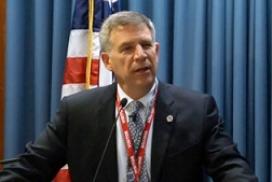TSA Evolves to "Intelligence-Driven" Passenger Screening
For a number of years after the Transportation Security Administration (TSA) was created in 2002, the agency generally screened all passengers in the same way, following a model of risk-based security that screened general passengers to the same degree as elected officials or travelers with top-secret government clearance.
"It didn't matter who you were then," said George Naccara, federal security director at Logan International Airport, "and now it just doesn't make sense anymore."
Today, the TSA, part of the U.S. Department of Homeland Security, is moving in a new direction, evolving as an agency to using "intelligence-driven" risk-based security that assesses the risk of every passenger and manages that risk appropriately, said Naccara, who spoke at a recent Straight from the Source exchange at Volpe, The National Transportation Systems Center. His talk focused on the concept of risk-based security and the TSA's recently implemented screening behavior detection processes.
The TSA has made notable advances by testing new concepts and pilot programs to accelerate screening by identifying passengers who are in a low-risk category so that they undergo a less rigorous screening and focusing on those that may need heightened scrutiny, said Naccara. For instance, the TSA recently eased screening procedures for travelers who appear to be age 12 or younger or age 75 or older. Naccara also discussed the "Pre-check Program," a system of various check levels for frequent flyers. Highly trained security personnel assess passengers quickly and make a determination on whether to provide expedited screening. Assessments are made from information already stored in the database, and pre-check starts when a passenger purchases a ticket.
In addition, Naccara talked about a new program currently in place at Logan International Airport in which trained security personnel speak to every passenger and look for signs of deception behavior. The feedback from travelers on this program has been favorable and the vast majority have expressed appreciation for this program's humanity. Naccara explained that this program allows trained security personnel to watch for more than just terrorists. It has already helped to improve referrals to state police and identify illegal immigrants and individuals with outstanding warrants. However, this process takes time, requiring deeply trained personnel, and the agency is currently looking at different, less time-consuming models.
Naccara concluded his talk noting that as an agency, "we are always looking for a better way," and recognized the need to develop an even clearer vision.

George Naccara, federal security director at Logan International Airport, speaking at Volpe. (Volpe photo)
